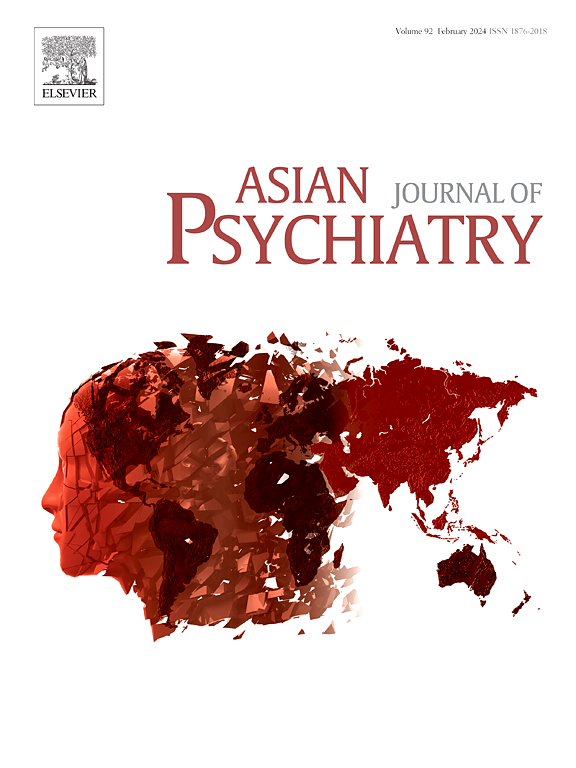Validation of an automated digital neuropsychological assessment system (DNAS)
IF 4.5
4区 医学
Q1 PSYCHIATRY
引用次数: 0
Abstract
Introduction
Diagnosing neurocognitive disorders, mild or major, requires a comprehensive assessment of domains of cognitive functions according to the Diagnostic and Statistical Manual of Mental Disorders, Fifth Edition, Text Revision (DSM-5-TR). Conventional neuropsychological assessments, usually conducted on a one-to-one assessment format, are under constant challenge of the demand on manpower and time resources, let alone its limited scalability to serve a larger population. Entering the era of digital healthcare emphasizing scalability, accessibility, and cost-effectiveness in delivering healthcare services, we have developed an automated digital neuropsychological assessment system - the Digital Neuropsychological Assessment System (DNAS), administered in individual or group format with minimal supervision.
Methods
We conducted a validation study of the DNAS, which encompasses 13 subtests assessing a spectrum of cognitive domains delineated in the DSM-5-TR for diagnosing neurocognitive disorders. These 13 tests fall in the domains of processing speed, attention, working memory, visual and verbal memory, spatial judgment, higher-order cognition, and social cognition tests.
Results
On a sample of 60 Chinese-speaking younger adults (mean age = 25.4 years old, SD = 3.6 years), we demonstrated the criterion validity (rs or ρs = .30 to .62) substantiated by the significant correlations between the DNAS and conventional assessment results.
Conclusions
Our findings confirmed that the DNAS is a promising alternative to conventional neuropsychological assessments in the era of digital healthcare. The DNAS contributes to improving the cost-effectiveness of delivering neuropsychological services and research. Its automated design enhances the scalability of neuropsychological services to people whose access to healthcare settings is limited.
自动数字神经心理评估系统(DNAS)的验证
诊断神经认知障碍,轻度或严重,需要根据精神障碍诊断和统计手册,第五版,文本修订(DSM-5-TR)的认知功能领域的全面评估。传统的神经心理学评估通常以一对一的评估形式进行,不断受到人力和时间资源需求的挑战,更不用说其服务于更大人群的可扩展性有限。进入数字医疗保健时代,强调可扩展性、可访问性和提供医疗保健服务的成本效益,我们开发了一种自动化的数字神经心理评估系统-数字神经心理评估系统(DNAS),以个人或团体形式进行管理,监督最少。方法我们对dna进行了一项验证研究,其中包括13个子测试,评估DSM-5-TR中描述的用于诊断神经认知障碍的认知域谱。这13项测试分为处理速度、注意力、工作记忆、视觉和言语记忆、空间判断、高阶认知和社会认知测试。结果在60名华语青年(平均年龄25.4岁,SD = 3.6岁)中,我们证明了标准的效度(rs或ρs = )。30 ~ 0.62),证实了dna与常规评估结果之间的显著相关性。结论我们的研究结果证实,在数字医疗时代,dna是传统神经心理学评估的一个有希望的替代方案。dna有助于提高提供神经心理学服务和研究的成本效益。它的自动化设计增强了神经心理学服务的可扩展性,为那些获得医疗保健设置有限的人提供服务。
本文章由计算机程序翻译,如有差异,请以英文原文为准。
求助全文
约1分钟内获得全文
求助全文
来源期刊

Asian journal of psychiatry
Medicine-Psychiatry and Mental Health
CiteScore
12.70
自引率
5.30%
发文量
297
审稿时长
35 days
期刊介绍:
The Asian Journal of Psychiatry serves as a comprehensive resource for psychiatrists, mental health clinicians, neurologists, physicians, mental health students, and policymakers. Its goal is to facilitate the exchange of research findings and clinical practices between Asia and the global community. The journal focuses on psychiatric research relevant to Asia, covering preclinical, clinical, service system, and policy development topics. It also highlights the socio-cultural diversity of the region in relation to mental health.
 求助内容:
求助内容: 应助结果提醒方式:
应助结果提醒方式:


